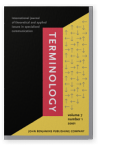Vol. 7:1 (2001) ► pp.5–29
Terminological investigations into specialized knowledge and texts
A case study of legislative discourse
Research has traditionally portrayed language for specialized purposes (LSP) as devoid of idiosyncrasy, indeterminacy, context-specificity, inter-cultural variation, inconsistency of expression and acceptation, among other attributes associated with general or non-specialized discourse. This article suggests that attitudes and practices spawned by an uncritical reading of traditional LSP research could indeed constitute a hindrance to the adequate processing of specialized material by translators, terminologists and by ordinary readers or communication parties. The article shows that there is cultural-epistemic relativity in specialized discourses, and that indeterminacy/inconsistency of concepts and terms is present in specialized discourses just as in non-specialized material. These two theses are shown to have implications for the establishment of concept and term equivalence, such as is called for during translating, compilation of terminological resources, or even during reading/comprehension.
